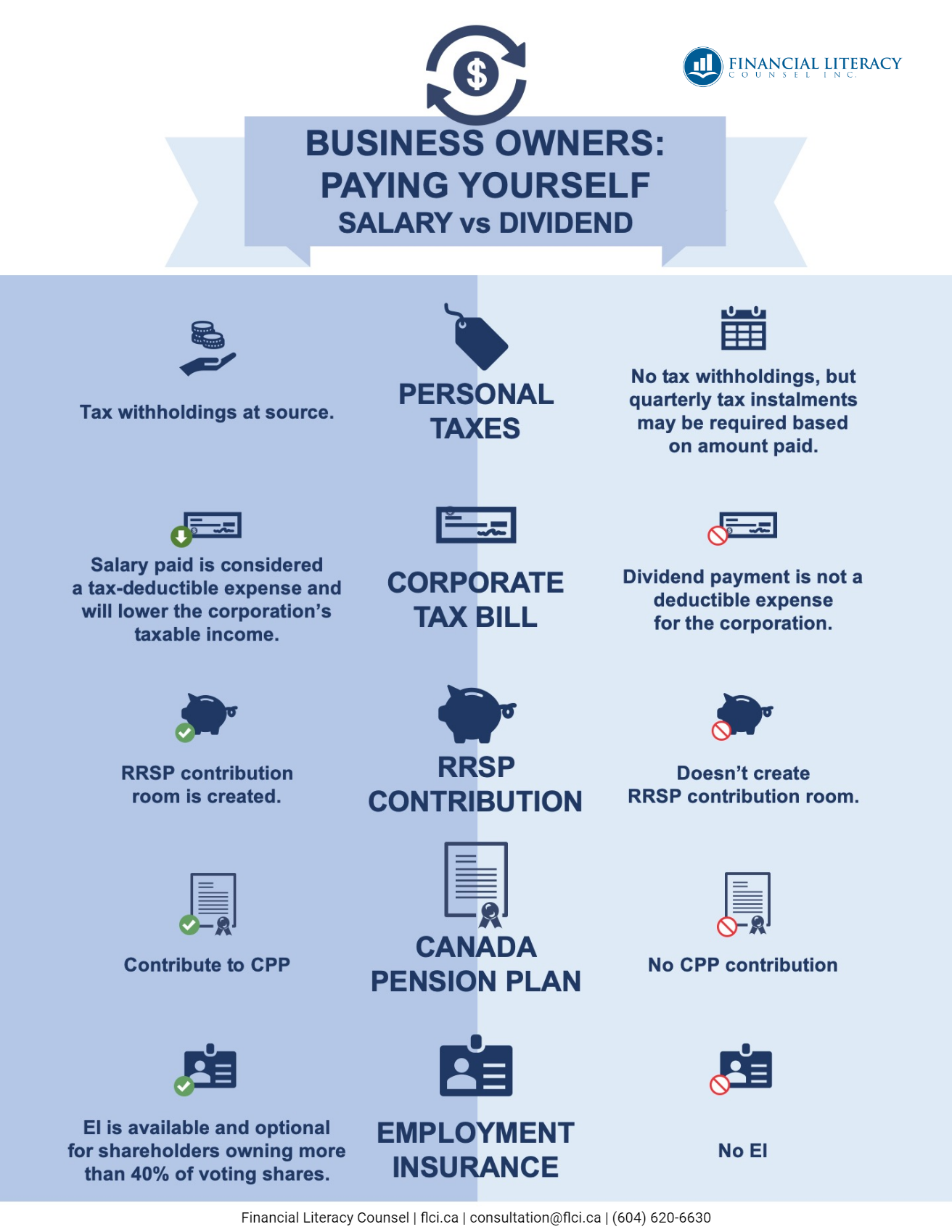As a business owner, you have the ability to pay yourself a salary or dividend, or a combination of both.
In this article, we will examine the difference between salary and dividends and review the advantages and disadvantages of each.
When deciding to pay yourself as a business owner, you’ll want to review the following factors:
-
How much do you need?
-
How much tax will you pay?
-
Other considerations including retirement and employment insurance
The infographic below summarizes the difference between paying yourself salary vs. dividend:

How much do you need?
Determine your cash flow on a personal and corporate level.
What is your personal after-tax cash flow need?
What is your corporate cash flow need?
Personal cash flow needs can include:
- Rent or mortgage payments
- Utility bills
- Groceries
- Gas
- Entertainment (books, movie tickets, restaurant meals, etc.)
Corporate cash flow needs can include:
- Equipment purchases
- Rent for office space
- Cost of hiring key employees
- Marketing expenses
Once you’ve assessed your cash flow and taxation you’ll have a clearer picture of whether paying yourself via salary or dividend will provide you with the amount you need.
How much tax will you pay?
For many business owners, tax can be a sizeable expense. Figure out how much you will pay in tax for each option—salary or dividend.
What is your personal income tax rate?
What is your corporate income tax rate?
Your personal tax rate will depend on your income and the province where you reside. Ensure you also include income from other sources to determine your tax rate, for example, rental income, investment income, pension income, etc.
For the 2022 taxation year, the combined Federal and BC small business tax rate is 11% on profits under $500,000 and 27% on profits above $500,000.
A dividend is the distribution of corporate profits to eligible shareholders. If you decide to pay yourself in dividends, check if you will be paying out eligible or ineligible dividends. The taxation of eligible dividends is more favourable than ineligible dividends from an individual income tax standpoint.
Salary is considered a tax-deductible expense. Therefore, paying yourself a salary will lower the corporation’s taxable income, whereas paying out dividends will not.
Other considerations
Should you decide to pay yourself in the form of a salary, several government programs will be available, and you will need to consider:
Do you need RRSP contribution room?
Are you interested in contributing to the Canada Pension Plan?
Do you need Employment Insurance?
If you need RRSP contribution room, ensure you receive a high enough salary to take full advantage of the maximum RRSP annual contribution that you can make.
Your decision to contribute to the Canada Pension Plan will be based on your unique circumstances. We recommend completing a cost-benefit analysis to determine the amount of contribution that makes sense for you.
For shareholders owning more than 40% of voting shares, Employment Insurance (EI) is optional. With this in mind, you need to consider situations that would qualify for the EI benefit and decide whether the potential benefit is worth the premium expense. Benefits worth careful consideration include maternity benefit, parental benefit, sickness benefit, compassionate care benefit, family caregiver benefit for children or family caregiver benefit for adults.
If you would like help determining the best mix of salary or dividend for your unique situation, get in touch with your financial planner or accountant.


